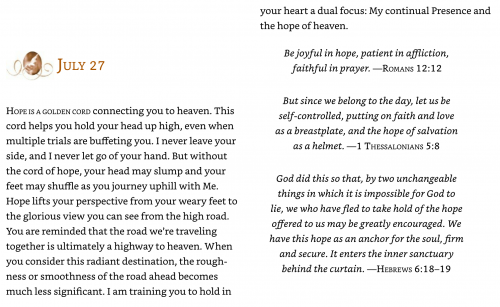Being Peaceful Change
Change
Comes from the Inside
Monday, July 27, 2020
As we come to know our soul gift more clearly, we almost always have to let go of some other “gifts” so we can do our one or two things with integrity. Such letting go frees us from always being driven by what has been called the “tyranny of the urgent.” [1] Soon urgency is a way of life, and things are not done peacefully from within. What if we choose to simply do one or two things wholeheartedly in our lives? That is all God expects and all we can probably do well. Too much good work becomes a violence to ourselves and, finally, to those around us.
Let’s just use our different gifts to create a unity in the work of service (Ephesians 4:12–13), and back one another up, without criticism or competition. Only in our peaceful, mutual honoring do we show forth the glory of God.
The Gospel is not about being nice; it is about being honest and just, and the world doesn’t like those two things very much. Our job is to learn how to be honest, but with love and respect. Dr. Martin Luther King, Jr. taught us that before we go out to witness for justice, we have to make sure that we can love and respect those with whom we disagree.
Imagine the surrender necessary for those who have been oppressed for hundreds of years to continue to work peacefully for justice. Frankly, I don’t know how anyone can do it without contemplation. How do we get to that deep place where we do not want to publicly expose, humiliate, or defeat our opponents, but rather work, as King said, for win-win situations? Seeking win-win solutions, not win-lose, takes a high level of spiritual development and demands spiritual conversion.
When we are hurt, we want to hurt back. When we are put down, we want to put down the opponent. This is our ego’s natural defense mechanism. We all move toward the ego, and we even solidify it as we get older if something doesn’t expose it for the lie that it is—not because it is bad, but because it thinks it is the whole and only thing! We change from inside—from the power position to the position of vulnerability and solidarity, which gradually changes everything.
True contemplation is the most subversive of activities because it undercuts the one thing that normally refuses to give way–our natural individualism and narcissism. Once we are freed from our narcissism that thinks we are the center of the world, or that our rights and dignity have to be defended before other people’s rights and dignity, we can finally live and act with justice and truth. People don’t really change by themselves. God changes us, if we can expose ourselves to God at a deep level.
Being Peaceful Change
Inner
Unity
Sunday, July 26, 2020
Before you speak of peace, you must first have it in your heart. —Francis of Assisi
Generations of Christians seem to have forgotten Jesus’ teachings on nonviolence. We’ve relegated visions of a peaceful kingdom to a far distant heaven. We hardly believed Jesus could have meant for us to turn the other cheek here and now. It took Gandhi, a Hindu, to help us apply Jesus’ peace-making in very practical ways. Dr. Martin Luther King, Jr. (1929–1968), drawing from Gandhi’s writings and example, brought nonviolence to the forefront of the civil rights movement in the 1960s.
The nonviolence of Gandhi, like that of the civil rights activists, affirmed a unity of peaceful ends and means. Thomas Merton, reflecting on Gandhi’s nonviolence, wrote:
Non-violence was not simply a political tactic which was supremely useful and efficacious in liberating his people from foreign rule . . . the spirit of non-violence sprang from an inner realization of spiritual unity in himself. The whole Gandhian concept of non-violent action . . . is incomprehensible if it is thought to be a means of achieving unity rather than as the fruit of inner unity already achieved. [1]
Training in nonviolence helps us admit that our secret inner attitudes are often cruel, attacking, judgmental, and harsh. The ego seems to find its energy precisely by having something to oppose, fix, or change. When the mind can judge something to be inferior, we feel superior. We must recognize our constant tendency toward negating reality, resisting it, opposing it, and attacking it on the level of our mind. This is the universal addiction.
Authentic spirituality is always first about you—about allowing your own heart and mind to be changed. It’s about getting your own who right. Who is it that is doing the perceiving? Is it your illusory, separate, false self; or is it your True Self, who you are in God?
As Thomas Keating said:
We’re all like localized vibrations of the infinite goodness of God’s presence. So love is our very nature. Love is our first, middle, and last name. Love is all; not [love as] sentimentality, but love that is self-forgetful and free of self-interest.
This is also marvelously exemplified in Gandhi’s life and work. He never tried to win anything. He just tried to show love; and that’s what ahimsa [the Hindu principle of nonviolence out of respect for all living things] really means. It’s not just a negative. Nonviolence doesn’t capture its meaning. It means to show love tirelessly, no matter what happens. That’s the meaning of turning the other cheek [Matthew 5:39]. Once in a while you have to defend somebody, but it means you’re always willing to suffer first for the cause—that is to say, for communion with your enemies. If you overcome your enemies [through force and violence], you’ve failed. If you make your enemies your partners, God has succeeded. [2]
